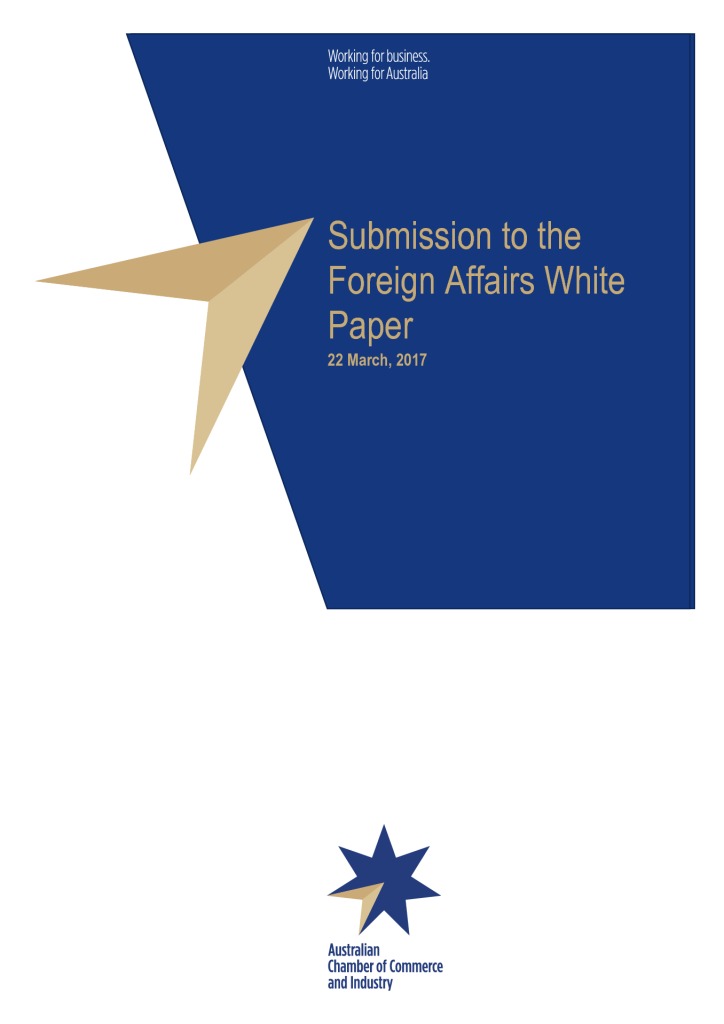Submission | Foreign Affairs White Paper
Australia has enjoyed a largely peaceful and overwhelmingly prosperous history over the past 70 years. Our position as a key ally, interlocutor and/or trade and investment partner to some of the world’s largest economies has been reinforced by our capacity to contribute to global initiatives and influence global decisions economically, diplomatically and militarily. But this position will be challenged into the future. Other nations are growing rapidly and will overtake us in global economic rankings over the coming decades, unless policies are adopted in Australia to boost the international competitiveness of our economy.
Australia needs to ensure that we are on a trajectory to regain and cement our position as a leading global economy. Failure to do so creates the risk that we will become less influential in global forums such as the UN, WTO and G20. This will mean that other nations will have greater opportunity than us to shape the global environment within which we and our economic lifelines – international flows of goods and services, capital and people – operate.
Our economy does not operate in isolation but the terms upon which we choose to deal with the world, international trade, welcoming investors and visitors and our efforts to assist others in our region to develop are still within our control. Our submission puts the case to our political leaders, decision makers and policy advisers that we cannot continue to undermine our competitiveness and ignore our decline in global economic rankings and the potential impact that will have on our ability to influence the global environment.
Australia’s position in the world is the product of our history, our reputation as a strong and capable ally and trading partner and the position of our economy among the top 20 nations in the world. The Australian Chamber has identified policies – our Top 10 in 10 and, more comprehensively, Getting on with Business – that need to be implemented to reverse our slide. The Australian Chamber supports measures to further liberalise markets at home and overseas and we ask for greater involvement for business in the negotiation of trade treaties. Australia has engaged effectively in the Asia Pacific but there remains a vast and largely untapped opportunity within our region, the Indian Ocean Rim. Australia has an opportunity to increase its trade and influence with these nations, and in doing so, develop a balance in our focus on the region.
The Australian Chamber outlines opportunities for Australia to strengthen its brand and its trade and foreign relations capacity. We call on the Australian Government to support the establishment of the Australian Centre for International Trade, centre linking business to research and education institutions in the field of international trade. The Centre will advance Australian interests in international trade and to foster national and international debate on international trade. We encourage the Government to adopt a single national brand, Australian Made Australian Grown, to promote Australian product and services at home and abroad.
We finally call for a strategic approach to aid and climate mitigation that achieves outcomes for recipient countries while firmly acting in Australia’s national interest and protecting our international competitiveness.
Summary of recommendations
- Build Australia’s strategic and policy interests in both the Asia – Pacific and the Indian Ocean Rim.
- Reprioritise the WTO and support reform of its internal architecture and its ability to deliver meaningful trade liberalisation by removing the requirement for a “single undertaking” in comprehensive trade liberalisation efforts.
- Adopt a clear and consistent approach to foreign investment and that the FIRB scrutiny thresholds should be rationalised and applied at a most-favoured-nation (MFN) level for all investors.
- Implement Joint Standing committee On Treaties (JSCOT) recommendations 1 and 2 – to involve business and civil society representatives more closely in trade negotiations and assess independently the impact of trade agreements.
- Endorse the Australian Made, Australian Grown logo as the common brand for Australian international promotion and re-direct investment away from the current range of alternates across its agencies.
- Promote the harmonisation of privacy and data policy between countries, providing certainty and stability for business and reducing barriers for start-ups and innovators. Policymakers must continue to prioritise reducing international barriers to cross-border data transfer and to engage with business and industry leaders as key stakeholders in the development of cyber policy.
- Remove Cabotage restrictions for coastal shipping and airlines unless the benefits of the restrictions to the community as a whole outweigh the costs and the objectives of government policy can only be achieved by restricting competition.
- Work with neighbouring countries to develop their economies, and ours, in ways that are energy efficient and environmentally responsible.
- Continue to engage with the international community to achieve environmentally effective and efficient climate change policies that minimise costs and distribute the international burden of mitigation equitably without compromising Australia’s international competitiveness.
- Government partner with the private sector in advocating for “free trade” and should invest $5 million in the development of an Australian Centre for International Trade in recognition of the public benefits that will derive from such a centre.
- Encourage improvements in the legal systems of developing countries around the world to support our overseas trade and investment interests.

